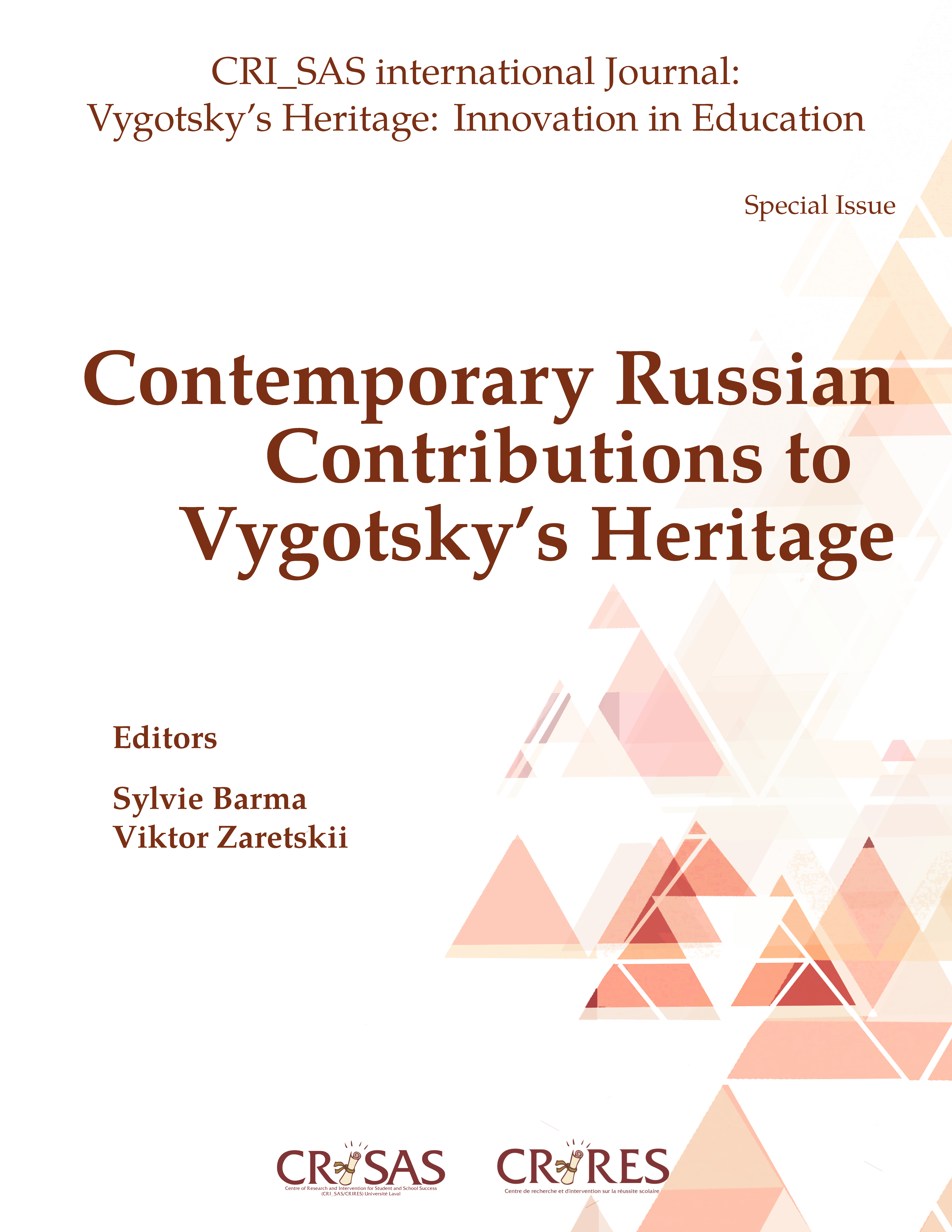Effectiveness Analysis of the 12 Step Recovery Program from the Standpoint of the Cultural-historical Approach
DOI :
https://doi.org/10.51657/ric.v4i1.41007Mots-clés :
Cultural-historical approach, 12- step program, Community, Process of recovery of addicts, Developpement, Training, Agency position, Tools of the programRésumé
Some provisions of Vygotsky’s concept allow us to understand in a new way the e˙ective-ness of the action of 12 step programs in the recovery of addicts. From our point of view, the program implements the following provisions of the cultural-historical approach: the basis for human mental development is a qualiitative change in one’s social situation; training leads to development; thanks to directive training, the addicted people aquire self-regulation; the program promotes the formation of the agency. Becoming a subject of one’s own activity for getting rid of this dependency and its reflection, a person begins to change his/her life in many directions. The article analyzes the tools of the program, allowing to develop a agency position in the process of recovery: the content of the pro-gram, the community itself as a collective teacher, specific members of the community as role models of a healthy lifestyle.
Références
Brun, E. A., & Tsvetkov, A. V. (2014). Practical psychology of dependence. Moscow: Nauka.
Bufe, C. (1991). Alcoholics anonymous: cult or cure? San Francisco: Sharp Press. de Leon, G. J. (1999). Therapeutic communities. In M. D. Galanter, D. Herbert, & M. D. Kleber (Eds.), Textbook of substance abuse treatment. Washington, DC: The American Psychiatric Press.
De Leon, G. J. (2010). Is the therapeutic community an evidence-based treatment? what the evidence says. Therapeutic communities, 31(2), 104-128.
Glatt, M. M. (1958). Group therapy in alcoholism. Addiction, 54(2), 133-148.
Gorski, T. T. (2009). Passages through recovery: An action plan for preventing relapse. New York: Simon and Schuster.
Jellinek, E. M. (1952). Phases of alcohol addiction. Quarterly journal of studies on alcohol, 13(4), 673-684.
Kabanov, M. M. (1998). Rehabilitation of the mentally ill. Moscow: Meditsina.
Kholmogorova, A. B., & Zaretskii, V. K. (2011). C mozhet li kul’turno-istoricheskaya kontseptsiya L. S. Vygotskogo pomoch’ nam luchshe ponyat’, chto my delaem kak psikhoterapevty [Can Vygotsky’s cultural-historical concept help us to better understand what we do as therapists?]. Kul’turno-istoricheskaya psikhologiya [Cultural-Historical Psychology](1), 108–118.
Korolenko, T. P., & Dmitrieva, N. V. (2012). Addiction: Handbook. Moscow: Institute for Counseling and System Solutions.
Pyatnitskaya, I. N. (1994). Narkomanii [Drug addictions]. Moscow: Meditsina Publ.
Sack, D. (2010). Why-the-hostility-toward-the-12-steps. https://www.psychologytoday.com/blog/where-science-meets-the-steps/201211/why-the-hostility-toward-the-12-steps.
Savina, E. A. (2015). Spiritual thirst: Recovery from alcoholism and drugs. Moscow: Meditsina Publ.
Stakhneva, L. A. (2010). Understanding the subject and subjectivity in modern psychology. scientific notes of orel state university. Moscow: Humanities and Social Sciences.
Vygotsky, L. S. (1956). Problema obucheniya i umstvennogo razvitiya v shkol’nom vozraste [Issue of learning and mental development in school-aged children]. In Izbrannye psikhologicheskie issledovaniya [selected psychologicalworks] (pp. 438–452). Moscow: APN RSFSR Publisher.
Vygotsky, L. S. (1982). Myshlenie i rech’ [Thinking and speech], Vol. 2. Moscow: Pedagogika.
Vygotsky, L. S. (1983). Collected works in 6 volumes. Vol. 3. Problems of psychic development. Moscow: Pedagogika.
Vygotsky, L. S. (2000). Problema vozrasta [The problem of age]. Moscow: Sobranie socinen.
Vygotsky, L. S. (2005). Psihologiya razvitiya rebenka [Psychology of child development]. Moscow: Sobranie socinen.
Zaretskii, Y. V. (2014). Sub’ektnaya pozitsiya shkol’nikov po otnosheniyu k uchebnoi deyatel’nosti v raznykh vozrastnykh periodakh [Schoolchildren’s position of agency towards the learning activity in different ages. Moscow: Ph.D. (Psychology) Thesis.
Téléchargements
Publié
Numéro
Rubrique
Licence
© Marya S. Radionova 2017

Cette œuvre est sous licence Creative Commons Attribution - Pas d'Utilisation Commerciale - Pas de Modification 4.0 International.

